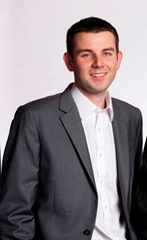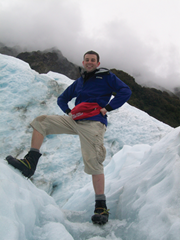Newstalk’s Chris Donoghue
 Formerly a runner for TV companies in London and New York, Chris Donoghue studied journalism in Griffith College before covering the 2008 American presidential election in Washington. A battle with non-Hodgkin’s lymphoma in 2006 didn’t deter the enthusiastic 27-year-old who now co-hosts Newstalk’s Breakfast show.
Formerly a runner for TV companies in London and New York, Chris Donoghue studied journalism in Griffith College before covering the 2008 American presidential election in Washington. A battle with non-Hodgkin’s lymphoma in 2006 didn’t deter the enthusiastic 27-year-old who now co-hosts Newstalk’s Breakfast show.
What education and career pathway led you to your current position?
I finished my leaving certificate in the class of 2001. I had just turned 17 and with the exams finished in June, I had only one plan: to do everything I could not to be in college in September 2001.
My reasons for not going to college right away were that I was rebelling and felt a tide was sweeping me into a third-level college rather than any conviction to study in any field. I had filled in my CAO and received my first-choice place but I didn’t take it and instead opted for a year out. I knew I wanted to work in media in some capacity and also wanted to flee Ireland so I set up a work placement in London which ended up with me also working in New York for part of the year.
This was before reality television had taken off to a huge extent so the company I worked for would fly wannabe television presenters to London and New York and film their show-reel with them. My job was as a runner, the work was hard and the clients were very difficult diva-types. I wouldn’t change a thing about that time and it totally focused my mind on coming home and starting college the following September. I attended Griffith College Dublin and did a BA in journalism and communications.
Describe a typical working day.
My alarm clock goes off at 4am. I have everything that follows down to a fine- tuned art until I leave the house. I’m generally driving through Dublin at about 4.30am and as I live a little bit away from the Newstalk studios, I am (usually) sitting at my desk somewhere between 4.45am and 5am.
The mornings are all about preparation for the show. We have a conference between the team, the station editor and the newsroom at 6.05am. Other time is spent reading the briefs for the upcoming show, reading the morning papers and checking a few tried and tested websites. Sometimes there are pre-record interviews with people or reporters in different time zones and we (usually) try to have everything in place by 6.30am. We’re on air from 7-10am and the time flies by.
After the show there is a quick de-briefing and then we meet again at 11.30am for an ideas meeting for the next day’s show. I will generally disappear after that unless there is a big event or interview in the afternoon. We always have a skype conference at 6pm when the night producer lays out the next morning’s show to us. The producers stay in touch with us throughout the day and evening but in a very non-intrusive way. I should go to bed at 9pm; I rarely do. Generally I nod off sometime during the BBC news at 10pm or Prime Time if it’s on.
How do you balance holding politicians and business leaders to account while ensuring listeners are entertained?
This is a big issue, especially when news is increasingly focused on politics, economics and recovery. You have to be able and willing to switch to lighter items and laugh at yourself and some of the stories around. I believe the news is the news though and if it is negative it needs to be reported without putting a positive spin on it. However, I don’t think you should dwell on it or give last rites to Ireland or lash out and declare: “We’re finished.” I find the vast majority of politicians and businesspeople we speak to very reasonable and I just try to be well-read on why I’m talking to them and just let the interview flow like a conversation.
 In your opinion, what are the main issues facing the 31st Dáil?
In your opinion, what are the main issues facing the 31st Dáil?
The Dáil needs primarily to show it is fit for purpose. I worked there for a while before presenting and I have seen politicians from all parties work really hard. However I have also seen efforts stopped dead by process or an attitude of “that’s not how things are done around here” and politicians lose their drive.
There is a huge opportunity now because we’ve had an election. The chance was there to cast a vote and the people we elected are in place. Democracy basically. This has removed the blind anger that Ireland retreated to en-masse when bad news came because we felt powerless. It was very convenient to just lash out and blame politics because it had let us down. That’s behind us now but the Dáil needs to show that the hard work people demanded at the polls is being delivered. Otherwise it will be a tragedy for the standing of politicians. They need to be aware that they’ve been given another chance, not allowed off the hook.
What was the reaction to your article in the Irish Independent about your chemotherapy treatment?
That article was strange because I really wasn’t prepared for the fact that people would read it. I wrote a couple of pieces at the request of a friend in the Independent tracking my surgery and treatment but the one I wrote after I went into remission is the one people still talk to me about. It was fantastic therapy for me to put it all down on paper. However, I wasn’t prepared for the legacy of having done that.
The one reaction that floors me is people with cancer or with close loved-ones who have died or are fighting the disease reaching out to just talk about it because they read the piece. I have nothing special or unique to me and in many ways I went through an easier time than others with cancer. However, I was offered the forum to write and I tried to be honest on paper and laugh at the funny bits and despair at the sad bits. I think people related to different elements of the story and the reaction was very humbling.
What is the most memorable story you have covered?
I was engrossed by the 2008 presidential election in the US and spent the best part of a year in the States covering it, the fall- out and beginning of the Obama presidency. I quit my full-time job at Newstalk to do it and they ended up employing me freelance to cover the story. The gamble paid off and I came back to Newstalk once the story ran its course. Having said that, nothing beats an Irish election count.
Sad stories stick with you and there is a difference between covering them from an office to in amongst a community. The days in Navan and surrounding towns following the bus crash that killed five schoolgirls always comes to my mind for seeing utter grief close up.
How do you like to relax?
A garda wouldn’t ask me that! I’m simple really. Good laughs with family and friends do the trick. I swim after work or go to the gym to clear my head during the week. I also live near the beach and manage to getthereforawalkagoodbitasIam generally free in the afternoon. You also can’t beat visiting somewhere new, either inside Ireland or more exotic and seeing new things.





